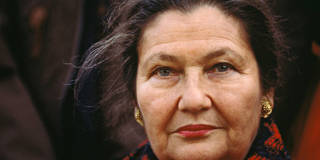Nothing made the great French and European politician Simone Veil angrier than the refrain about the Holocaust being unspeakable, which was supposed to explain why its survivors, upon returning home, retreated into silence. The truth, as she could attest, was that no one wanted to hear about it.
PARIS – I have an abiding image of Simone Veil, the French (and later European) politician who died last week. It is a black-and-white photo taken in September 1979, between Rosh Hashanah and Yom Kippur – a period known as the Days of Awe – in Paris, before the memorial to the unknown Jewish martyr. A young man, bareheaded behind a lectern, is speaking in honor of those who died in the Holocaust. Simone Veil is standing in the front row, a handsome woman lost in her thoughts yet still attentive. She is skeptical, stern, incredulous, wary. Afterwards, she will say to the young man, in a tone of gentle reproach, “too lyrical.”

PARIS – I have an abiding image of Simone Veil, the French (and later European) politician who died last week. It is a black-and-white photo taken in September 1979, between Rosh Hashanah and Yom Kippur – a period known as the Days of Awe – in Paris, before the memorial to the unknown Jewish martyr. A young man, bareheaded behind a lectern, is speaking in honor of those who died in the Holocaust. Simone Veil is standing in the front row, a handsome woman lost in her thoughts yet still attentive. She is skeptical, stern, incredulous, wary. Afterwards, she will say to the young man, in a tone of gentle reproach, “too lyrical.”